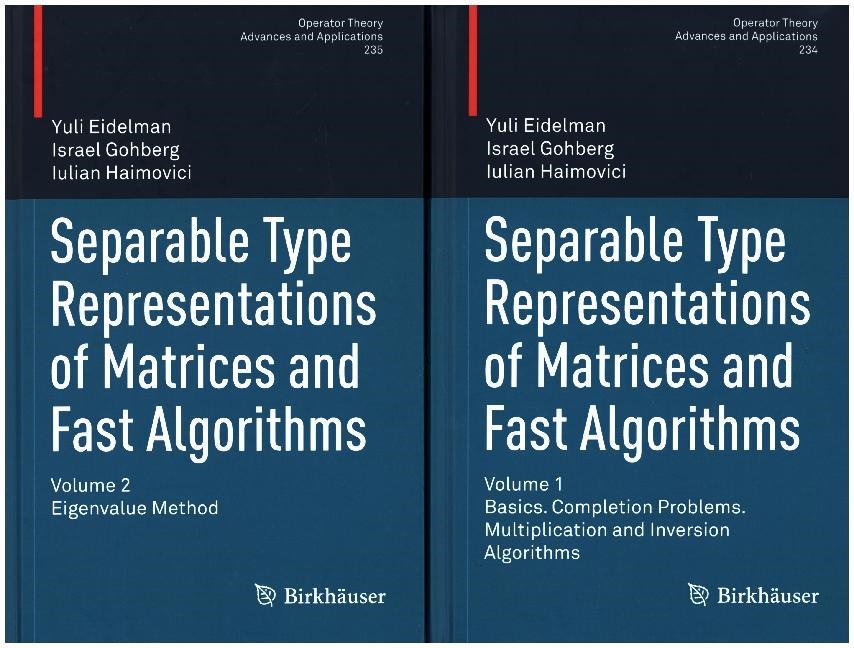Read more
This two-volume work presents a systematic theoretical and computational study of several types of generalizations of separable matrices. The primary focus is on fast algorithms (many of linear complexity) for matrices in semiseparable, quasiseparable, band and companion form. The work examines algorithms of multiplication, inversion and description of eigenstructure and includes a wealth of illustrative examples throughout the different chapters.The first volume consists of four parts. The first part is mainly theoretical in character, introducing and studying the quasiseparable and semiseparable representations of matrices and minimal rank completion problems. Three further completions are treated in the second part. The first applications of the quasiseparable and semiseparable structure are included in the third part, where the interplay between the quasiseparable structure and discrete time varying linear systems with boundary conditions play an essential role. The fourth part includes factorization and inversion fast algorithms for matrices via quasiseparable and semiseparable structures. The work is based mostly on results obtained by the authors and their coauthors. Due to its many significant applications and accessible style, the text will be a valuable resource for engineers, scientists, numerical analysts, computer scientists and mathematicians alike.The second volume, consisting of four parts, addresses the eigenvalue problem for matrices with quasiseparable structure and applications to the polynomial root finding problem. In the first part the properties of the characteristic polynomials of principal leading submatrices, the structure of eigenspaces and the basic methods for computing eigenvalues are studied in detail for matrices with quasiseparable representation of the first order. The second part is devoted to the divide and conquer method, with the main algorithms also being derived for matrices with quasiseparable representation of order one. The QR iteration method for some classes of matrices with quasiseparable representations of any order is studied in the third part. This method is then used in the last part in order to provide a fast solver for the polynomial root finding problem. The work is based mostly on results obtained by the authors and their coauthors. Due to its many significant applications and accessible style, the text will be a valuable resource for engineers, scientists, numerical analysts, computer scientists and mathematicians alike.
Summary
This two-volume work presents a systematic theoretical and computational study of several types of generalizations of separable matrices. The primary focus is on fast algorithms (many of linear complexity) for matrices in semiseparable, quasiseparable, band and companion form. The work examines algorithms of multiplication, inversion and description of eigenstructure and includes a wealth of illustrative examples throughout the different chapters.
The first volume consists of four parts. The first part is mainly theoretical in character, introducing and studying the quasiseparable and semiseparable representations of matrices and minimal rank completion problems. Three further completions are treated in the second part. The first applications of the quasiseparable and semiseparable structure are included in the third part, where the interplay between the quasiseparable structure and discrete time varying linear systems with boundary conditions play an essential role. The fourth part includes factorization and inversion fast algorithms for matrices via quasiseparable and semiseparable structures. The work is based mostly on results obtained by the authors and their coauthors. Due to its many significant applications and accessible style, the text will be a valuable resource for engineers, scientists, numerical analysts, computer scientists and mathematicians alike.
The second volume, consisting of four parts, addresses the eigenvalue problem for matrices with quasiseparable structure and applications to the polynomial root finding problem. In the first part the properties of the characteristic polynomials of principal leading submatrices, the structure of eigenspaces and the basic methods for computing eigenvalues are studied in detail for matrices with quasiseparable representation of the first order. The second part is devoted to the divide and conquer method, with the main algorithms also being derived for matrices with quasiseparable representation of order one. The QR iteration method for some classes of matrices with quasiseparable representations of any order is studied in the third part. This method is then used in the last part in order to provide a fast solver for the polynomial root finding problem. The work is based mostly on results obtained by the authors and their coauthors. Due to its many significant applications and accessible style, the text will be a valuable resource for engineers, scientists, numerical analysts, computer scientists and mathematicians alike.

